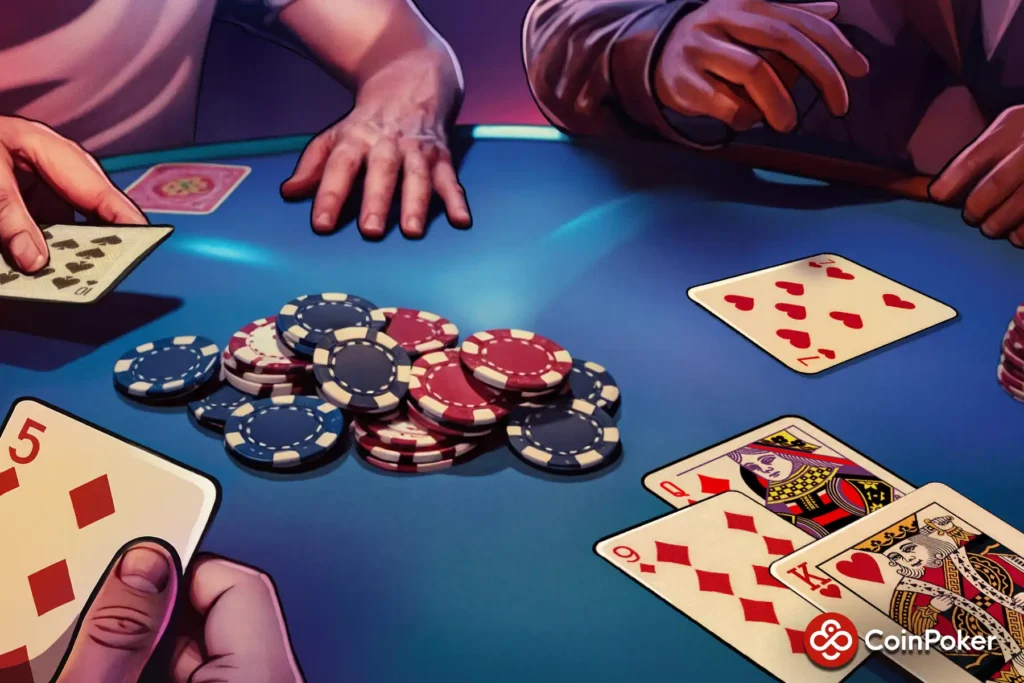Last Updated: 18 February 2026
Let’s Investigate: Is Poker Gambling or Not?
While casual poker players may consider poker to be gambling, seasoned pros will tell you otherwise. The public sees poker through Hollywood’s lens, flashy bluffs, wild bets, and big wins. Even though poker is considered gambling for tax purposes, many argue it rewards long-term strategy over luck.
So, is poker gambling or skill? That depends on how we define gambling itself. Before we take sides, we need to understand what “gambling” really means and how poker fits that definition today.

What is the Definition of Gambling?
According to the Cambridge Dictionary, gambling is “the activity of risking money on the result of something, such as a game or horse race, hoping to win more money.” By that definition, poker seems to qualify, but there’s more to it than chance alone.
Now that we understand the definition of gambling, let’s look at the reasons why poker could be considered gambling, and the reasons why many believe it isn’t.
3 Reasons Why Poker IS Considered Gambling
In the eyes of many people, especially casual players, lawmakers, and the media, poker is gambling. It involves risk, money, and unpredictable outcomes. Millions see it no differently than roulette or blackjack. This view is shaped by how poker is played, how it’s taxed, and how it’s regulated. Let’s explore three specific reasons why so many people firmly believe poker belongs in the same category as traditional gambling games.
1. The Element of Luck or Chance
Every poker hand begins with a random shuffle. You can’t control the cards you’re dealt, and a beginner can beat a pro on pure luck alone. This element of chance, especially in the short term, is a key reason why poker is considered gambling by many. No matter how skilled you are, luck can decide the outcome, just like in slot games or roulette.
2. The Real Money in Play
Poker isn’t just played for fun; it’s played for real money. Whether it’s a $1 home game or a $1 million tournament, the financial stakes are central. Wagering cash adds risk, reward, and emotional intensity, all hallmarks of gambling. Because players win or lose actual money based on uncertain outcomes, many people naturally classify poker as gambling, especially when viewed alongside casino games.
3. The Element of Risk
Poker is a game of calculated risk. Every call, raise, or bluff involves betting money with no guaranteed return. Even the most strategic decisions can result in losses due to unpredictable outcomes. This constant exposure to financial risk is a defining trait of gambling. For many, the willingness to stake real money on uncertain results is exactly what makes poker gambling, regardless of how much skill is involved.
3 Reasons Why Poker Is NOT Considered Gambling
Professional players, poker educators, and many courts around the world have argued that poker is not gambling. In the eyes of countless experienced players, it’s a skill-based competition with measurable edges based in poker math. They point to its long-term strategy, mental discipline, and win-rate consistency. Let’s explore three of the most compelling reasons why poker stands apart from games of pure chance, and why many people believe it shouldn’t be called gambling at all.
1. The Element of Skill
When asking “is poker gambling or skill,” the answer often depends on how well one understands the game. Unlike roulette or slots, poker allows skilled players to consistently outperform less experienced opponents. Decisions like folding marginal hands, reading bet sizes, and managing bankrolls require deep strategy. For example, a pro might fold pocket queens pre-flop in a tournament based on position and player tendencies, something luck alone would never dictate. This ongoing decision-making process is why many view poker as a skill game, not gambling.
2. Poker is a Mind Sport
Many people point to poker’s status as a mind sport when debating the question: is poker a sport or gambling? Like chess or bridge, poker demands concentration, memory, pattern recognition, and emotional control. It’s officially recognized as a mind sport by the International Federation of Poker (IFP), reinforcing its strategic depth. Players compete in global tournaments, train with solvers, and study game theory, all hallmarks of a skill-driven discipline. This perspective pushes poker further away from traditional gambling in the eyes of many.
3. U.S. Federal Judge Ruling
In 2012, U.S. District Judge Jack Weinstein dismissed charges against Lawrence DiCristina, a Staten Island poker-room operator, ruled poker is “predominately a game of skill” and not a violation of the Illegal Gambling Business Act. He observed that poker shares more traits with skill-based games and differs from chance-dominated betting. However, this was a legal interpretation for federal statutes, and state definitions still vary. So while this ruling supports the idea poker isn’t gambling in one context, definitions and legal treatments can differ widely depending on jurisdiction.
So, Is Poker Gambling? Here’s the Answer.
Yes, poker is gambling, but it’s far from pure chance. It involves risking money on uncertain outcomes, which fits the legal and dictionary definitions of gambling.
However, poker stands apart due to its skill ceiling. In the words of Benjamin Rolle, (Bencb), a legendary online poker player, poker is about “studying hard, being honest with your leaks, and striving for constant improvement”. Players who are able to adhere to this strategy are generally the ones who win in the long run.
If you’re ready to test your skills at a certified fair poker table, sign up at CoinPoker and experience the difference.
Play Online Poker Responsibly
Even though poker is a skill-based game, it’s still important to recognize the risks involved, especially when real money is at stake. At CoinPoker, we support fair play and provide responsible gambling tools to help you manage your limits, avoid tilt, and play with control. Responsible poker is smart poker.
For additional support and resources, visit:
Related Pages
Join Our Thriving Gaming Community
CoinPoker offers an unmatched poker experience: instant crypto transactions, provably fair gaming, and no verification requirements.
Join CoinPoker and claim a 150% welcome bonus for poker games.
Play Now

FAQs
Yes, poker involves risk and money, which meets the standard definition of gambling.
It’s both! Poker is gambling with strong elements of strategy and skill.
It depends on local laws. In many places, poker is legal under gambling regulations.
Yes, when played for money, poker is considered a form of gambling.
Poker is gambling legally, but it’s also recognized as a mind sport.















